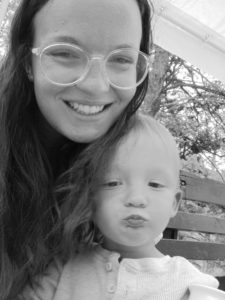Julia

Disclaimer: The following article mentions the topic of suicide or other sensitive subjects, which may trigger negative thoughts and feelings for those currently suffering or still recovering from a mental or mood disorder. Reader discretion is advised.
My postpartum depression started basically as soon as I got pregnant. I had wanted children my entire life, but I wasn’t ready for an unexpected pregnancy. I felt so much guilt and fear. I hated being pregnant the entire time, but I wanted to do things as naturally as possible. I scheduled an induction for 6 days after my due date and tried my hardest to go into labor before then. I had two false starts, which were very hard for me. I felt like I was already failing at being a mom.
When labor started, the contractions were very severe, and I felt unable to do any of the pain-relieving techniques that I had learned. Though I wanted to have a natural birth, I opted for an epidural, which caused additional problems after leaking spinal fluid. After 12 hours of labor, our beautiful baby boy entered the world. Because of the epidural, I was sick after giving birth and in so much pain. I didn’t change any diapers in the hospital and barely held my son. I wanted so badly to breastfeed, but how could I when I couldn’t even look at my baby to see if he was eating? The best way for the spinal leak to heal was to lay as flat as I could.
After a couple of weeks, the postpartum depression started really setting in. I had no interest in my baby and would cry for no reason all the time. When I held my baby, I felt like there was a giant plexiglass barrier separating us, blocking any love or connection from reaching either of us. For months (and maybe a year) I didn’t feel like my son loved me. During this period, my husband was a champion. He got up for every nighttime feeding and went to work in the morning. I wanted to help, but I couldn’t trust myself to not hurt my baby. My husband and I both felt so alone during this time.
I knew that there was something wrong with me for a long time, and I knew I needed to do something about it. I felt so much guilt, sadness, and anger, and believed that I had done my son a disservice by becoming his mother. I felt like everyone in the family would be happier if I was no longer a part of it. I did open up to my husband and some friends, and while they did their best, none of them understood what I was going through. I finally got on some medication, which is probably the biggest reason I am still alive today. Even with the medication, I still struggle.
I’ve learned that it’s okay to mess up and fail, as long as you try again. When you try again, you still don’t have to perfect – just keep doing your best. Things might be going well for a really long time and come crashing in around you, but that doesn’t mean you’ve failed or that you have to start your process and progress all over. I learned that you need to put yourself and your health first. You deserve your boundaries, and you don’t need to explain them or justify them to have them respected. Don’t entertain people who make you feel guilty for taking care of yourself. Your best is always enough; it is not selfish to make your happiness a main priority.
